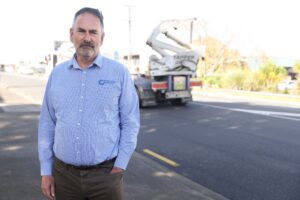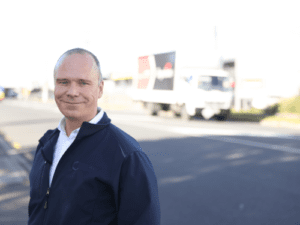Latest slip on the Brynderwyns shows just why fast track consent process is critical.
Tuesday this week an ominous email appeared in my inbox.
There’s been a slip. My heart sank.
Less than an hour later I joined a steering group call to learn that a major part of a hillside had let go on Kauri corner in the Brynderwyns. I didn’t need to waste energy imaging what it looked like, NZTA had the video many of us have seen, showing what a truly terrifying sight that is.
On the call we all had the same initial reaction – thank goodness no one was hurt or killed. But actually, it was a case of thank goodness the engineers at NZTA had closed the road for the construction. What could have happened with one lane open to traffic doesn’t bear thinking about.
Representing so many transport operators who make their living traversing the Brynderwyns, my thoughts quickly turned to how long is this going to take to re-open, and how much more cost will this drive into transport? And Northland businesses?
But actually, this predicament sheets back to when the Brynderwyns diversion was cancelled. So here we are.
The fact is, NZTA have an incredibly difficult job to do in an incredibly demanding bit of topography. No one who watched that video is left in any doubt. This is no place to build a road. But until the diversion is built, there is no choice.
Interestingly, the very next day NRC was called by TVNZ to comment on the fast track consents leglislation before parliament. This bill is critical – speeding up infrastructure build is a no brainer. We spend too long hand wringing over whether to build infrastructure, and focussing on the negatives. The Brynderwyn slip shows the real price we pay when we dither. Luckily we didn’t pay in lives this time.
Right about the same time, but a long way down the road in Wellington, James Smith was attending a policy workshop with NZTA and the MOT. Here is the summary outlining the work ahead:
This week we had the first of what will likely be monthly policy workshops with the NZ Transport Agency and Ministry of Transport. This was a really productive session, and came about from us providing a list of ongoing issues we have with transport legislation and how it is applied e.g. permitting, log books, driver licensing, TSLs etc.
Our list was and is long, so we’re going to focus first on driver licensing and VDAM, before moving to fatigue and TSLs. We hope this focussed approach will see operational change where possible, and help officials on the longer path to justifying legislative change if that’s the only fix. Our next meeting is in a month’s time, and we’ll continue to update you as we go.
Wherever the road takes you…stay safe.
Justin
Justin Tighe-Umbers
CEO | National Road Carriers Assn
DDI: +64 9 636 2951





